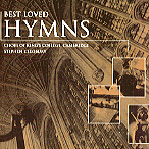. . . to arouse the emotions of a religiously awakened congregation. . . These words describing the intent of John and Charles Wesley in writing their hymns may or may not find acceptance in the hearts and minds of all who might listen to this excellent recording from the hallowed space and revered choir of King’s College, Cambridge, but the fact of this music’s power to inspire, to motivate, and to meaningfully live in both an individual and collective consciousness is undeniable. There’s a reason why the hymns we grew up with never leave us, why after many years the hearing of one will bring us to a special place that no other music can. And that’s why recordings such as this one continue to be made and continue to be popular with faithful churchgoers and former congregants alike. If you enjoy this kind of music–that is, hymns rooted in the Anglican church tradition–you will find much pleasure here, whether it be meditative or openly exuberant. The Choir of King’s College has been singing congregational music for centuries, and the tradition, impeccably articulated and warmly expressed by the choir, remains truly and firmly preserved to this day.
As you listen, and as you check out the uncommonly detailed liner notes (visually challenged, get out your glasses!), you’ll discover not only many familiar hymns–Praise, my soul, the King of heaven; A mighty fortress is our God; When I survey the wondrous Cross (Rockingham)–but also that none other than John Rutter had more than a casual hand in this program. He offers new arrangements/harmonizations for verses of some hymns–quite effective and attractive, by the way–and the choir sings his oft-performed setting of Morning has broken. And for those who think all hymns recordings are basically the same, virtually all of the best-known tunes among these 18 selections are given fresh settings, several with descants and a few with brass accompaniments. Among the not-so-common hymns are some of the most beautiful–Dear Lord and Father of mankind (Repton), My song is love unknown (Love Unknown), and a hymn-anthem by William Harris, O what their joy and their glory must be. The harp is imaginatively used to accompany both the lovely Irish tune Slane (Be thou my vision) and a luscious new arrangement of Brother James’ Air (The Lord’s My Shepherd) by Stephen Johns (church choirs take note). Elsewhere, the accompaniments are varied to include organ and/or brass, interspersed with whole verses sung a cappella. One of the highlights of the program is another relatively new work, a hymn-anthem by British conductor/composer Stephen Jackson based on the familiar text and tune Let all mortal flesh keep silence. Jackson ingeniously uses choir and organ and music full of rich colors, lush dissonances, and bold strokes and clashes of melody to capture the magic and mystery of the ancient text.
Of course, for most potential listeners, nearly as important–or perhaps more important–than the quality of the performances is knowing exactly which hymns are included. Among those not already mentioned are Vaughan Williams’ Come down, O Love divine (arguably among the most profoundly beautiful hymns ever written) and Handel’s Thine be the glory, along with The day thou gavest, Lord, is ended, Glorious things of thee are spoken, and Drop, drop slow tears (music by Orlando Gibbons). The program appropriately concludes with Vaughan Williams’ famous ceremonial setting of All people that on earth do dwell (one of the most rousing and best of the many versions on disc). As with most hymns recordings made in huge, resonant, congregation-free spaces and employing the services of a large organ, the sections with full organ accompaniment tend to rumble and thunder a lot–which would make those Wesley’s beam as brightly as the sun, but which can overwhelm the singing at times. However, you probably won’t mind because you’ll most likely be singing right along with the choir.
































